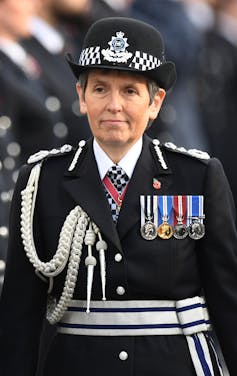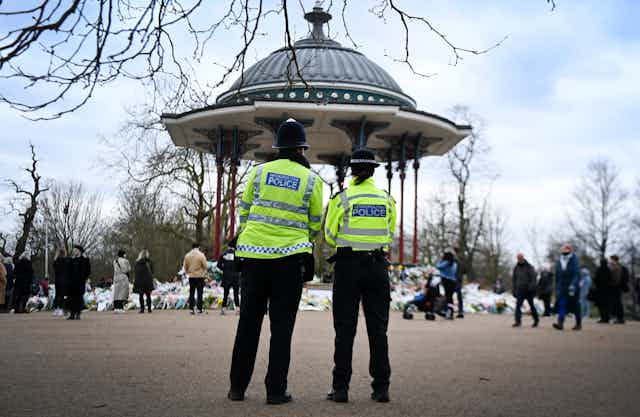The ability of the British police to operate effectively depends on the consent and support of the general public. The brutal kidnapping and murder of Sarah Everhard by PC Wayne Couzens in March 2021 severely damaged public trust in the police, and their ability to “police by consent”.
Long before he raped and murdered this young woman, Couzens should have been viewed as an “insider risk”, as his previous indecent behaviour should have flagged concerns. There have been reports that Couzens committed sexual offences and exhibited extremely disturbing behaviour several years before he killed Sarah Everard, and this continued right up until just days before her death.
His misuse of his authority as a serving officer to target Sarah Everard has critically undermined the reputation of the Metropolitan Police and the wider police service. And this has an impact on its ability to carry out its lawful functions.
For the police service, reputation and public trust are its most important assets, specifically because of the policing-by-consent approach it adopts. If the public no longer respect, support and cooperate with the police, this fundamental pact is broken.
Police failings
It is easy to view this tragic case with hindsight and place greater emphasis on the actions of some who were not in possession of all the facts at the time. While considerable criticism has been made of police senior management, much of Couzens’ behaviour appears not to have been officially recorded prior to the murder.
It is clear that these previous incidents of indecent behaviour were not investigated properly. Might there have been a conscious – or unconscious – reluctance on the part of officers to call out one of their own? Or perhaps they were unaware that Couzens was a police officer? If investigators were aware of this fact, it might indicate a worrying culture where unacceptable behaviour by some officers is tolerated.
This culture has also allowed for instances of inappropriate sexual behaviour where officers have exploited their authority. Former colleagues of Couzens at the Civil Nuclear Constabulary nicknamed him “the rapist” because he made female colleagues feel uncomfortable, yet nothing was done about this. Neither was the Metropolitan Police made aware of this when he transferred forces.
As reported in the media recently, there have been instances of poor police behaviour where misogynistic, racist and homophobic “humour” has been shared between officers on private messaging networks. While some might explain this as a way of coping with the emotions that stem from dealing with harrowing cases, such behaviour is not an acceptable way to deal with the stresses of the job.
This is not about freedom of speech – it is about having views that are incompatible with the role of a police officer. Failure to investigate and deal appropriately with this behaviour will only further erode public trust and confidence.
Changing the culture
The media and politicians have been demanding that immediate action to be taken, such as the resignations of senior officers, policing in pairs, and blanket approaches to police vetting. Her Majesty’s Inspectorate of Constabulary and Fire and Rescue Services (HMICFRS) required forces to re-vet all officers by July 2020, yet more than a quarter of police forces in England, Wales and Northern Ireland have still not vetted all their officers.

However, these approaches focus on short-term solutions. To truly succeed, the right foundations must be in place to embed permanent organisational change. This must be led from the top and amount to more than lip service. Clearly some parts of the UK’s police service have lacked the will to directly challenge a culture which has allowed misogyny, sexism, bullying, racism and a lack of respect for colleagues and the public to go unchecked.
The tragic events of Sarah Everard’s death should be used to drive permanent change. The police service needs to fully understand, accept and manage the risks that some of its people pose to the service, and especially, to the public. It is also essential for the police to grasp the value of reputation and public trust, and mitigate any risks to them. I believe the vast majority of police officers support such an agenda for change.
To recover from this crisis, the issues must be addressed head on. Aberrant behaviour must be challenged and dealt with. The police service needs to actively promote a culture where not reporting a fellow police officer’s inappropriate behaviour due to fear of reprisals or being ostracised, is no longer the norm.
Supervisors must be encouraged to play a critical role and take action when they – or any officer – identify behaviour that is concerning. The human resources apparatus must be involved, and leadership also has a critical role in ensuring there is full transparency during this process. The police need to demonstrate to the public that a change in culture is underway. Only then will they be able to recover the trust that has been so badly eroded by this appalling murder.

